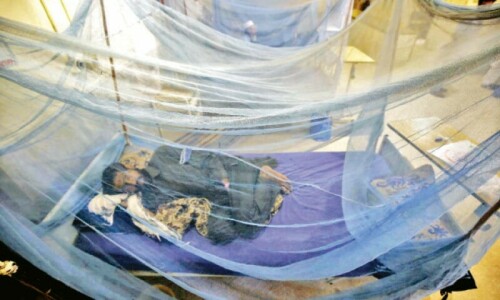PESHAWAR: Health department has expedited coordinated efforts in collaboration with line departments to prevent Dengue Haemorrhagic Fever following the approval of Dengue Action Plan 2024 by the government last week.
“We have not detected any positive case this year so far bur work is under way to ensure that the vector-borne ailment remains under control. Focus for prevention is strong surveillance of the virus throughout the province,” Dr Irshad Roghani, the director public health at directorate-general health services, told Dawn.
He said that government last week approved Dengue Action Plan (DAP), 2024. He added that they were sure that there would be no obstacle to implement the plan in the province.
“We are concentrating on the high-risk districts of Mardan, Khyber, Peshawar, Nowshera and Haripur because these districts were endemic and cases were regularly reported from there but other districts were also covered as per plan,” he said.
Official says health dept has sought Rs145 million to enforce the programme
Dr Irshad said that a month ago, they reported a positive case diagnosed at a private laboratory but it turned out to be false when re-tested in Public Health Reference Laboratory (PHRL) at Khyber Medical University.
“We have also instructed all the officials in 36 districts to send samples from the symptomatic patients to PHRL for confirmation,” he said.
He said that in 2022, the province recorded 22,000 dengue cases and 18 deaths but the number of cases came down to just 747 in 2023. He said that most of the cases were transferred from other provinces and cities. “As per plan, we inspect 40 houses in the neighbourhood of a positive case to ensure that the mosquito-borne disease doesn’t spread,” he said.
Dr Irshad said that the role of lady health workers was excellent in surveillance of the disease and identification of larva. He added that a total of 283,000 houses were examined in the province and the larva was found in 150 houses that was destroyed immediately.
He said that they had deployed 41 entomologists, who had helped the health department in identification and destruction of mosquito larvae and strengthening surveillance and as result cases were declined over the past one year.
The director of public health said that there were dengue prevention response units in every district. He added that those units swung into action in case of any infection and took measures for checking the production of mosquitoes, the carrier and transmitters of dengue virus.
Dr Irshad said that awareness regarding the causes of the disease was an ongoing exercise during which the teams of health department visited schools and houses and informed people about the destruction of virus and ways to stop its breeding.
“We, in collaboration with district administrations, are carrying out checking of tyre shops because these are the main source of mosquitoes-breeding due to accumulation of water inside,” he said.
He said that the government approved the plan to ensure full-fledged preventive work. “We have demanded Rs145 million to implement the plan,” he said. He added that in the past three months, they conducted 35 walks and organised seminars that were 82,000 individuals including men and women.
Dr Irshad said dengue was ‘completely’ preventable through elimination of water pools, which the health department was ensuring. He added that training programmes were also arranged for doctors, nurses and paramedics to manage dengue cases at local level.
“Alongside awareness and surveillance, the training of doctors, paramedics and nurses on case management is also in progress to ensure that the cases are diagnosed promptly and isolated to prevent spread of the infection,” he said.
Published in Dawn, May 13th, 2024












































Dear visitor, the comments section is undergoing an overhaul and will return soon.